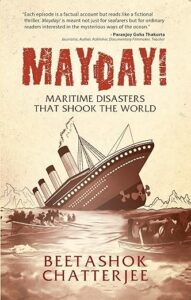
Beetashok Chatterjee’s non-fiction Mayday! grips the reader from the very first page, much like his previous works of fiction. The veteran sea captain recounts 13 civilian maritime tragedies, some infamous, like the Titanic, and others less familiar but each retold with clarity, empathy, and a keen professional eye.
What sets this book apart is the balance it strikes between technical detail and human emotion. The book explains complex nautical concepts in accessible, layperson terms, using diagrams and footnotes when necessary. The result is a narrative that informs without overwhelming the reader.
Mr Bee’s storytelling carries the authority of firsthand maritime experience. He analyzes each disaster and pinpoints where things went wrong, determining if the tragedy was preventable. Negligence, human error, and nature’s sheer power emerge as recurring themes. In doing so, he not only humanises the victims but also underlines the environmental devastation that often follows in the wake of such events, from oil spills to long-term ecosystem damage.
Of the 13 accounts, the Sewol ferry disaster stands out as especially haunting. The author’s narration captures both the chaos of the moment and the quiet grief of its aftermath, making the reader feel the weight of every loss.
The prose is crisp yet evocative. While a few nautical terms may slow down the pace for some readers, the emotional core of each story keeps the pages turning. The combination of lived experience and storytelling skill ensures that each account feels authentic, immediate, and deeply human.
At its heart, Mayday! is more than a chronicle of shipwrecks and maritime disasters. It is a meditation on human resilience, vulnerability, and the enduring lesson that no one is bigger than nature. It also serves as a timely reminder of the cost of complacency at sea, both in human lives and environmental damage.
If you enjoy survival stories, maritime history, or environmental narratives, Mayday! delivers on all counts. It is informative and interesting and offers a rare combination of technical insight and narrative flair. It leaves the reader not just informed, but moved, and with a renewed respect for the unpredictable, untameable force that is the ocean.
A must-read for anyone fascinated by stories of survival, tragedy, and the human spirit.
 Sonal Singh On Sonal's Table
Sonal Singh On Sonal's Table


Thank you for a great review! You’ve been very kind.